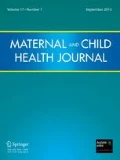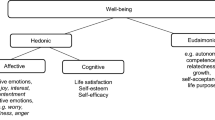Abstract
In the presence of physical and psychological disturbances in the postpartum period, perceived social support is often regarded as a protective factor in women’s mental health. This work evaluates the psychometric properties of the French version of a questionnaire widely used internationally to measure perceived social support, which has not been yet validated in French: the Multidimensional Scale of Perceived Social Support (MSPSS). This study collected data from 148 women (30.5 ± 5.12 years) who agreed to complete the MSPSS and a scale assessing symptoms of postpartum depression (Edinburgh Post-Natal Depression Scale, EPDS) 1 and 4 months after childbirth. The results confirm the original three-factor structure of the scale. The Cronbach’s alpha coefficients are excellent. The total scale score is correlated with all three dimensions and a significantly negative correlation is found between MSPSS and EPDS. The results suggest that the French tool has generally good internal reliability. The MSPSS can provide useful data helping to identify French-speaking people at risk for negative feelings (e.g., mood disorders of perinatal period).
Similar content being viewed by others
References
American Psychiatric Association. (2000). Diagnostic and statistical manual of mental disorder—4th edition revised (DSM-IV-R). Washington, DC: APA.
Denis, A., Parant, O., & Callahan, S. (2011). Frequency of and risk factors for post-traumatic stress disorder related to birth: A prospective longitudinal study in a French population. Journal of Reproductive and Infant Psychology, 29(2), 125–135.
Gaillard, A., Le Strat, Y., Mandelbrot, L., Keita, H., & Dubertret, C. (2014). Predictors of postpartum depression: Prospective study of 264 women followed during pregnancy and postpartum. Psychiatry Research, 215(2), 341–346.
Kleiman, E. M., & Riskind, J. H. (2013). Utilized social support and self-esteem mediate the relationship between perceived social support and suicide ideation. A test of a multiple mediator model. Crisis, 34(1), 42–49.
Stein, A., Cooper, P. J., Campbell, E. A., Day, A., & Altman, P. E. A. (1989). Social adversity and perinatal complications: Their relation to postnatal depression. British Medical Journal, 298, 1073–1074.
O’Hara, M. W. (1986). Social support, life events and depression during pregnancy and the puerperium. Archive of General Psychiatry, 43, 569–573.
Séjourné, N., Beaumé, M., Vaslot, V., & Chabrol, H. (2012). Effets du congé de paternité sur la dépression du post-partum maternelle. Gynécologie Obstétrique et Fertilité, 40, 360–364.
Husain, N., Cruickshank, K., Husain, M., Khan, S., Tomenson, B., & Rahman, A. (2012). Social stress and depression during pregnancy and in the postnatal period in British Pakistani mothers: A cohort study. Journal of Affective Disorders, 140, 268–276.
Lemola, S., Stadlmayr, W., & Grob, A. (2007). Maternal adjustment five months after birth: The impact of the subjective experience of childbirth and emotional support from the partner. Journal of Reproductive and Infant Psychology, 25(3), 190–202.
Ege, E., Timur, S., Zincir, H., Geckil, E., & Sunar-Reeder, B. (2008). Social support and symptoms of postpartum depression among new mothers in Eastern Turkey. Journal of Obstetrics and Gynaecology Research, 34(4), 585–593.
Yagmur, Y., & Ulukoca, N. (2010). Social support and postpartum depression in low-socioeconomic level postpartum women in Eastern Turkey. International Journal of Public Health, 55(6), 543–549.
Zimet, G. D., Dalhem, N. W., Zimet, S. G., & Farley, G. K. (1988). The Multidimensional Scale of Perceived Social Support. Journal of Personality Assessment, 52, 30–41.
Canty-Mitchell, J., & Zimet, G. D. (2000). Psychometric properties of the Multidimensional Scale of Perceived Social Support in urban adolescents. American Journal of Community Psychology, 28, 391–400.
Edwards, L. M. (2004). Measuring perceived social support in Mexican American youth: Psychometric properties of the Multidimensional Scale of Perceived Social Support. Hispanic Journal of Behavioral Sciences, 26, 187–194.
Ramaswamy, V., Aroian, K. J., & Templin, T. N. (2009). Adaptation and psychometric evaluation of the Multidimensional Scale of Perceived Social Support for Arab American Adolescents. American Journal of Community Psychology, 43, 49–56.
Cheng, S. T., & Chan, A. C. M. (2004). The multidimensional scale of perceived social support: Dimensionality and age and gender differences in adolescents. Personality and Individual Differences, 37(7), 1359–1369.
Clara, I. P., Cox, B., Murray, W. E., Murray, L. T., & Torgrudc, L. J. (2003). Confirmatory factor analysis of the Multidimensional Scale of Perceived Social Support in clinically distressed and student samples. Journal of Personality Assessment, 81(3), 265–270.
Dahlem, N. W., Zimet, G. D., & Walker, R. R. (1991). The Multidimensional Scale of Perceived Social Support: A confirmation study. Journal of Clinical Psychology, 47, 756–761.
Duru, E. (2007). Re-examination of the psychometric characteristics of the multidimensional scale of perceived social support among Turkish university students. Social Behavior and Personnality, 35(4), 443–452.
Eker, D., & Arkar, H. (1995). Perceived social support: Psychometric properties of the MSPSS in normal and pathological groups in a developing country. Social Psychiatry and Psychiatric Epidemiology, 30, 121–126.
Kasarian, S. S., & McCabe, S. B. (1991). Dimensions of social support in the MSPSS: Factorial structure, reliability, and theoretical implications. Journal of Community Psychology, 19, 150–160.
Aroian, K., Templin, T. N., & Ramaswamy, V. (2010). Adaptation and psychometric evaluation of the Multidimensional Scale of Perceived Social Support for Arab immigrant women. Health Care for Women International, 31, 153–169.
Cecil, H., Stanley, M. A., Carrion, P. G., & Swann, A. (1995). Psychometric properties of the MSPSS and NOS in psychiatric outpatients. Journal of Clinical Psychology, 51, 593–602.
Vaingankar, J. A., Abdin, E., & Chong, S. A. (2012). Exploratory and confirmatory factor analyses of the Multidimensional Scale of Perceived Social Support in patients with schizophrenia. Comprehensive Psychiatry, 53, 286–291.
Zimet, G. D., Powel, S. S., Farley, G. K., Werkman, S., & Berkoff, K. A. (1990). Psychometric charactéristics of the Multidimensional Scale of Perceived Social Support. Journal of Personality Assessment, 55(3&4), 610–617.
Stanley, M. A., Beck, J. G., & Zebb, B. J. (1998). Psychometric properties of the MSPSS in older adults. Aging and Mental Health, 2, 186–193.
Chou, K. L. (2000). Assessing Chinese adolescents’ social support: The Multidimensional Scale of Perceived Social Support. Personality and Individual Differences, 28(2), 299–307.
Ng, C. G., Amer Siddiq, A. N., Aida, S. A., Zainal, N. Z., & Koh, O. H. (2010). Validation of the Malay version of the Multidimensional Scale of Perceived Social Support (MSPSS-M) among a group of medical students in Faculty of medicine. Asian Journal of Psychiatry, 3(1), 3–6.
Bruwer, B., Emsley, R., Kidd, M., Lochner, C., & Seedat, S. (2008). Psychometric properties of the Multidimensional Scale of Perceived Social Support in youth. Comprehensive Psychiatry, 49(2), 195–201.
Prezza, M., & Pacilli, M. G. (2002). Perceived social support from significant others, family and friends and several socio-demographic characteristics. Journal of Community and Applied Social Psychology, 12, 422–429.
Callahan, S., & Denis, A. (2013). Irrational beliefs and motherhood: “Hot cognitions” and their relationship to perinatal psychopathology. Journal de Thérapie Comportementale et Cognitive, 23(1), 3–8.
Minnes, S., Singer, L. T., Humphrey-Wall, R., & Satayathum, S. (2008). Child Abuse and Neglect, 32(3), 353–366.
Séjourné, N., Beaume, M., Vaslot, V., & Chabrol, H. (2012). Effets du congé de paternité sur la dépression du post-partum maternelle. Gynécologie Obstétrique & Fertilité, 40(6), 360–364.
Séjourné, N., Vaslot, V., Beamé, M., Goutaudier, N., & Chabrol, H. (2012). The impact of paternity leave and paternal involvement in child care on maternal postpartum depression. Journal of Reproductive and Infant Psychology, 30(2), 135–144.
Cox, J. L., Holden, J. M., & Sagovsky, R. (1987). Detection of postnatal depression. Development of the 10-item Edinburgh Post-natal Depression Scale. British Journal of Psychiatry, 150, 782–786.
Guedeney, N., & Fermanian, J. (1998). Validation study of the French version of the Edinburgh Post-Natal Depression Scale (EPDS): New results about use and psychometric properties. European Psychiatry, 13, 83–89.
Tabachnick, B. G., & Fidell, L. S. (2007). Using multivariate statistics (5th ed.). New York: Allyn and Bacon.
Hu, L. T., & Bentler, P. M. (1999). Cutoff criteria for fit indexes in covariance structure analysis. Conventional criteria versus new alternatives. Structural Equation Modeling, 6, 1–55.
MacCallum, R. C., Browne, M. W., & Sugawara, H. M. (1996). Power analysis and determination of sample size for covariance structure modeling. Psychological Methods, 1(2), 130–149.
Spiteri, G., & Borg Xuereb, R. (2012). Going back to work after childbirth: Women’s lived experiences. Journal of Reproductive and Infant Psychology, 30(2), 201–216.
Guedeney, N., Jacquemain, F., & Glangeaud-Freudenthal, M.-C. (2000). Le rôle des facteurs environnementaux, de la vulnérabilité individuelle et du support social dans le risque de survenue des dépressions du post-partum. Devenir, 12, 13–33.
Author information
Authors and Affiliations
Corresponding author
Appendix
Appendix
See Table 6.
Rights and permissions
About this article
Cite this article
Denis, A., Callahan, S. & Bouvard, M. Evaluation of the French Version of the Multidimensional Scale of Perceived Social Support During the Postpartum Period. Matern Child Health J 19, 1245–1251 (2015). https://doi.org/10.1007/s10995-014-1630-9
Published:
Issue Date:
DOI: https://doi.org/10.1007/s10995-014-1630-9




